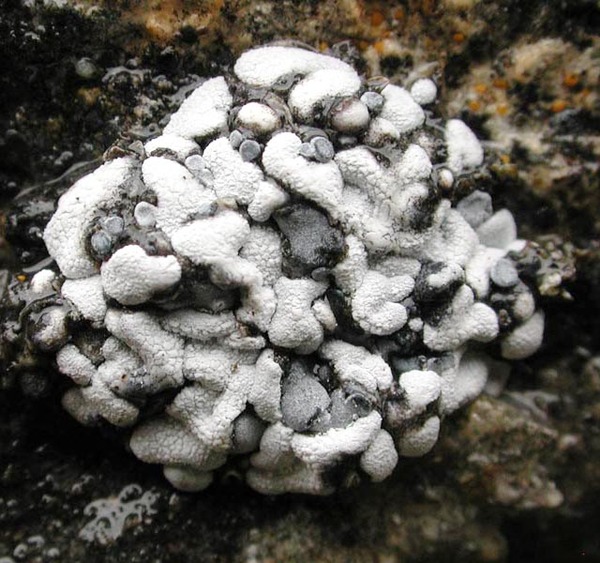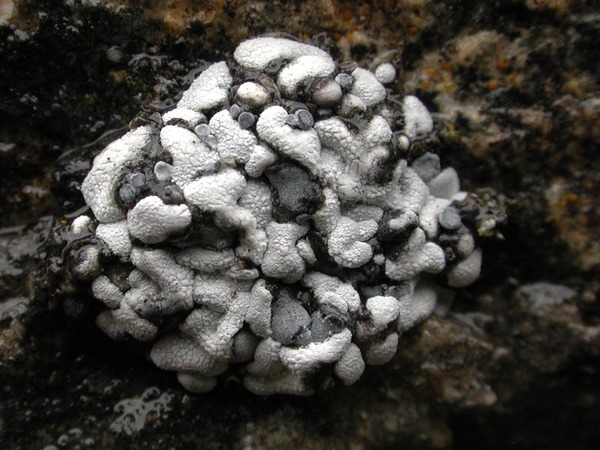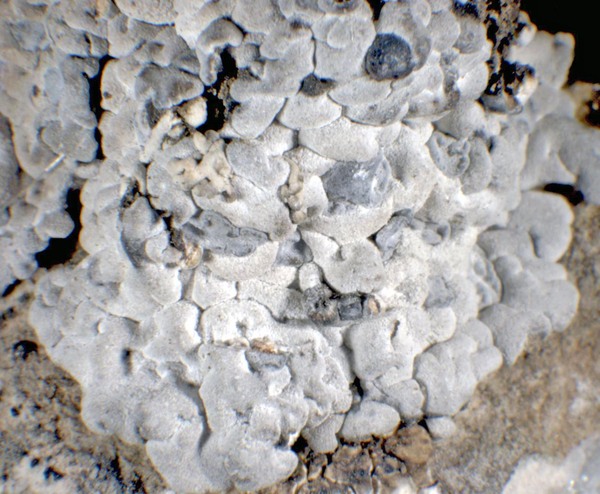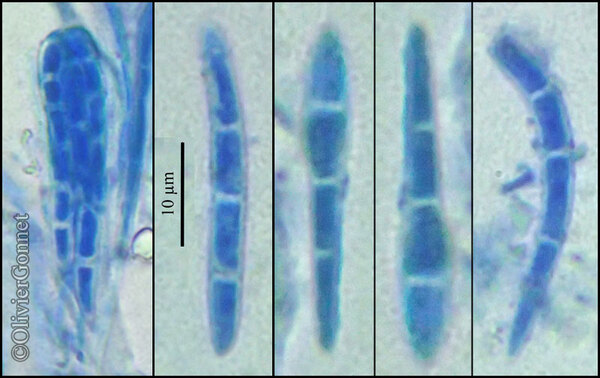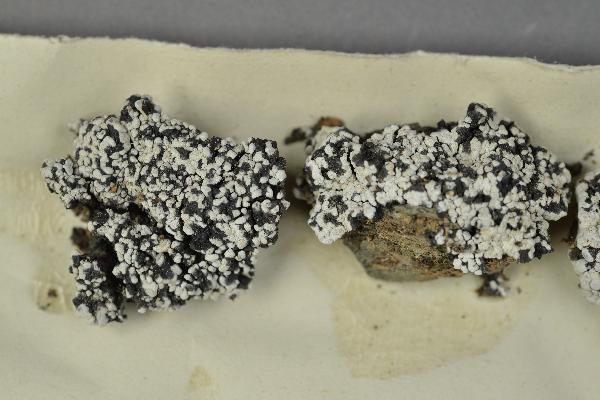Thalloidima alutaceum Anzi
Atti Soc. Ital. Sc. Nat. Milano, 9: 249, 1866.
Synonyms: Biatorina alutacea (Anzi) Jatta; Thalloidima intermedium A. Massal. ex Arnold; Toninia alutacea (Anzi) Jatta; Toninia intermedia (Arnold) H. Olivier; Toninia subcandida B. de Lesd.?
Distribution: N - VG, Frl (Tretiach 1996), Ven (Nimis 1994, Caniglia & al. 1999, Nascimbene & Caniglia 2003c, Nascimbene 2005c, Thor & Nascimbene 2007), TAA (Spitale & Nascimbene 2012), Lomb, Piem, VA (Piervittori & Isocrono 1999), Emil (Tretiach & al. 2008, Fariselli & al. 2020). C - Tosc (Tretiach & al. 2008), Marc (Nimis & Tretiach 1999). S - Bas (Nimis & Tretiach 1999), Cal.
Description: Thallus squamulose, forming up to 4 cm wide rosettes, the squamules up to 4(-5) mm across, scattered to usually contiguous, the marginal ones slightly elongate and radiating, the central ones convex to bullate, white, densely covered in a granular pruina, usually with shallow fissures in the cortex. Upper cortex 30-110 µm thick, including an up to 60 µm thick epinecral which later is heavily encrusted with crystals of calcium oxalates; medulla white, with crystals; lower cortex with a dark pigment (and hence lower surface pale brown to black), reacting K+ and N+ violet. Apothecia frequent, lecideine, black, but usually pruinose, up to 2 mm across, persistently marginate. Proper exciple grey in the outer rim, pale grey to colourless in inner part, the grey parts K+ and N+ violet; epithecium grey, K+ and N+ violet, with crystals; hymenium colourless, 60-70 µm high; paraphyses coherent, simple or sparingly branched and anastomosing in upper part, thin-walled, the apical cell distinctly swollen and covered by a gelatinous pigment cap; hypothecium colourless to pale yellowish brown in upper part, colourless in lower part, lacking crystals. Asci 8-spored, clavate to cylindrical-clavate, the apical dome K/I+ dark blue with a pale, conical-pointed apical cushion (axial mass), the wall I-, but the thin outer gel I+ blue, Bacidia-type. Ascospores mainly 3-septate, hyaline, narrowly fusiform to needle-like, 25-33(-40) x 3-4(-5) µm. Photobiont chlorococcoid. Spot tests: thallus K-, C-, KC-, P-. Chemistry: thallus without lichen substances; apothecia with the Sedifolia-grey pigment.Note: an arctic-alpine, circumpolar species with southern outposts in steppic-continental regions, found in fissures of calciferous rocks; when young it often overgrows cyanobacterial colonies and cyanobacterial lichens.
Growth form: Squamulose
Substrata: rocks, soil, terricolous mosses, and plant debris
Photobiont: green algae other than Trentepohlia
Reproductive strategy: mainly sexual
Commonnes-rarity: (info)
Alpine belt: rather common
Subalpine belt: common
Oromediterranean belt: rather common
Montane belt: rather common
Submediterranean belt: rather rare
Padanian area: absent
Humid submediterranean belt: very rare
Humid mediterranean belt: absent
Dry mediterranean belt: absent

Predictive model
Herbarium samples
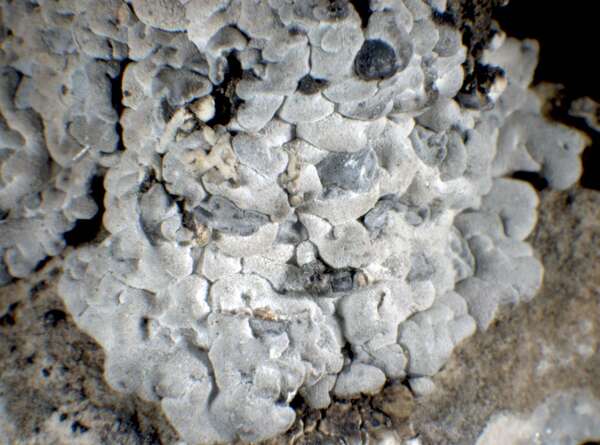

P.L. Nimis; Owner: Department of Life Sciences, University of Trieste
Herbarium: TSB (13560)
2001/12/15
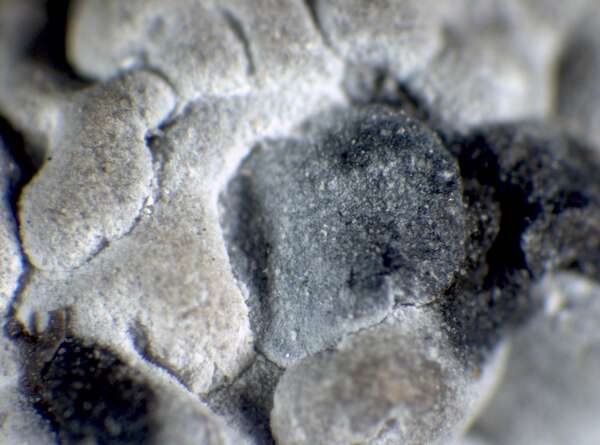

P.L. Nimis; Owner: Department of Life Sciences, University of Trieste
Herbarium: TSB (13560)
2001/12/15
apothecium
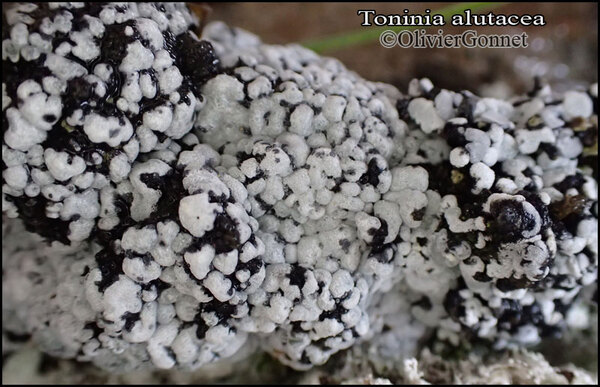
Courtesy Danièle et Olivier Gonnet - Source: https://www.afl-lichenologie.fr/Photos_AFL/Photos_AFL_T/Textes_T2/Thalloidima_alutaceum.htm
France, 18/9/2015 - Combe Chaulange, Villars-de-Lans - Isère
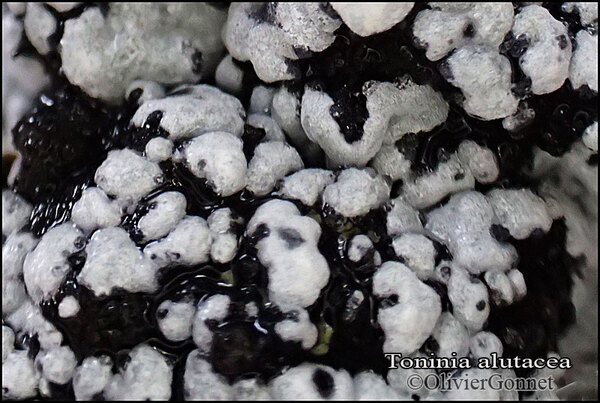
Courtesy Danièle et Olivier Gonnet - Source: https://www.afl-lichenologie.fr/Photos_AFL/Photos_AFL_T/Textes_T2/Thalloidima_alutaceum.htm
France, 18/9/2015 - Combe Chaulange, Villars-de-Lans - Isère
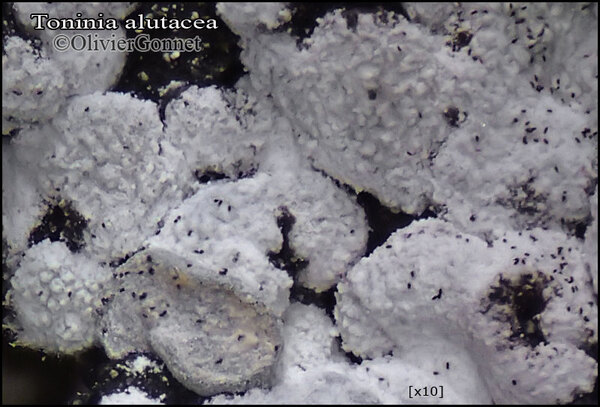
Courtesy Danièle et Olivier Gonnet - Source: https://www.afl-lichenologie.fr/Photos_AFL/Photos_AFL_T/Textes_T2/Thalloidima_alutaceum.htm
France, 18/9/2015 - Combe Chaulange, Villars-de-Lans - Isère
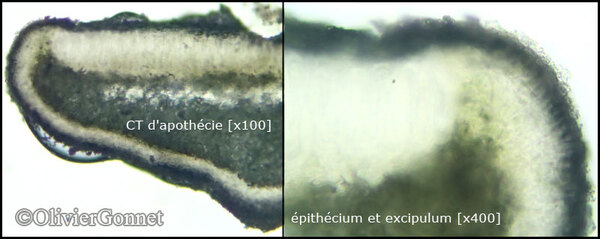
Courtesy Danièle et Olivier Gonnet - Source: https://www.afl-lichenologie.fr/Photos_AFL/Photos_AFL_T/Textes_T2/Thalloidima_alutaceum.htm
France, 18/9/2015 - Combe Chaulange, Villars-de-Lans - Isère
Growth form: Squamulose
Substrata: rocks, soil, terricolous mosses, and plant debris
Photobiont: green algae other than Trentepohlia
Reproductive strategy: mainly sexual
Commonnes-rarity: (info)
Alpine belt: rather common
Subalpine belt: common
Oromediterranean belt: rather common
Montane belt: rather common
Submediterranean belt: rather rare
Padanian area: absent
Humid submediterranean belt: very rare
Humid mediterranean belt: absent
Dry mediterranean belt: absent

Predictive model
| Herbarium samples |


P.L. Nimis; Owner: Department of Life Sciences, University of Trieste
Herbarium: TSB (13560)
2001/12/15


P.L. Nimis; Owner: Department of Life Sciences, University of Trieste
Herbarium: TSB (13560)
2001/12/15
apothecium

Courtesy Danièle et Olivier Gonnet - Source: https://www.afl-lichenologie.fr/Photos_AFL/Photos_AFL_T/Textes_T2/Thalloidima_alutaceum.htm
France, 18/9/2015 - Combe Chaulange, Villars-de-Lans - Isère

Courtesy Danièle et Olivier Gonnet - Source: https://www.afl-lichenologie.fr/Photos_AFL/Photos_AFL_T/Textes_T2/Thalloidima_alutaceum.htm
France, 18/9/2015 - Combe Chaulange, Villars-de-Lans - Isère

Courtesy Danièle et Olivier Gonnet - Source: https://www.afl-lichenologie.fr/Photos_AFL/Photos_AFL_T/Textes_T2/Thalloidima_alutaceum.htm
France, 18/9/2015 - Combe Chaulange, Villars-de-Lans - Isère

 INDEX FUNGORUM
INDEX FUNGORUM
 GBIF
GBIF
 DOLICHENS
DOLICHENS
